Related Research Articles

Hollywood Squares is an American game show in which two contestants compete in a game of tic-tac-toe to win cash and prizes. The show piloted on NBC in 1965 and the regular series debuted in 1966 on the same network. The board for the game is a 3 × 3 vertical stack of open-faced cubes, each occupied by a celebrity seated at a desk and facing the contestants. The stars are asked questions by the host and the contestants judge the truth of their answers to gain squares in the right pattern to win the game.

Battleship is a strategy type guessing game for two players. It is played on ruled grids on which each player's fleet of warships are marked. The locations of the fleets are concealed from the other player. Players alternate turns calling "shots" at the other player's ships, and the objective of the game is to destroy the opposing player's fleet.

Card Sharks is an American television game show. It was created by Chester Feldman for Mark Goodson-Bill Todman Productions. The game features two contestants who attempt to predict the outcome of survey questions to gain control of a row of oversized playing cards, then determine whether the next card drawn is higher or lower. The title Card Sharks is a play on the term "card sharp", a person skilled at card games.
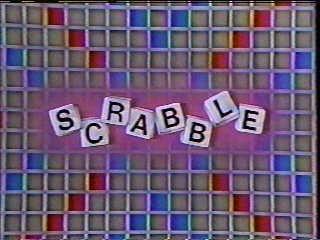
Scrabble is an American television game show based upon the board game Scrabble. Contestants competed in a series of rounds to fill in words within a crossword puzzle for cash. Muriel Green of Exposure Unlimited developed the idea for a television game show based upon the board game concept. During 1983, Green convinced Selchow and Righter, who at that time owned the Scrabble board game, to license Exposure Unlimited to produce the game show. Exposure Unlimited co-produced the show with Reg Grundy Productions, and licensed the show to NBC. Scrabble aired on NBC from July 2, 1984, to March 23, 1990, and again from January 18 to June 11, 1993. Chuck Woolery hosted the program. Jay Stewart was the announcer for the first year. Charlie Tuna replaced him in the mid-1985 and remained through the original run and the entirety of the 1993 revival.

Twenty-One is an American game show originally hosted by Jack Barry that initially aired on NBC from 1956 to 1958. Produced by Jack Barry-Dan Enright Productions, two contestants competed against each other in separate isolation booths, answering general-knowledge questions to earn 21 total points. The program became notorious when it was found to be rigged as part of the 1950s quiz show scandals, which nearly caused the demise of the entire genre in the wake of United States Senate investigations. The 1994 film Quiz Show is based on these events. A new version of the show aired on NBC in 2000 with Maury Povich as host.
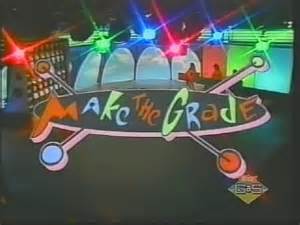
Make the Grade is a children's game show that aired from October 2, 1989, to September 14, 1990, on Nickelodeon.

High Rollers is an American television game show that involved contestants trying to win prizes by rolling dice. The format was based on the dice game shut the box.

The Match Game-Hollywood Squares Hour is an American television panel game show that combined two panel games of the 1960s and 1970s – Match Game and Hollywood Squares – into an hour-long format.
Catch Phrase is an American game show which ran from September 16, 1985, through January 10, 1986, in syndication. The object of the show was to solve "catch phrases", which were animated picture puzzles designed to represent objects or sayings. Art James was the host of the show, his last game show hosting job before he retired from television, and John Harlan was the announcer. The program was created by Steve Radosh and produced by Pasetta Productions, with Telepictures distributing.
In the Grid was a British game show that aired on Five from 30 October 2006 to 2 February 2007, hosted by Les Dennis.
Temptation: The New Sale of the Century is an American syndicated television game show loosely based on both the original Australian and American Sale of the Century versions, plus the 2005 Australian version, also titled Temptation. The show began airing in syndication on September 10, 2007, with the last first-run episode airing on May 23, 2008. Reruns continued until September 5, 2008.
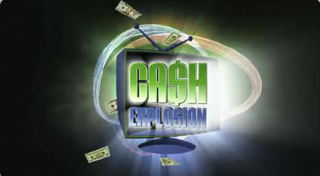
Cash Explosion, known as Cash Explosion: Double Play from 1989 until 2012, is the official Ohio Lottery TV game show, which is broadcast on television stations throughout Ohio. The show originated in Cleveland and is now taped by Mills James Productions in Columbus, Ohio.
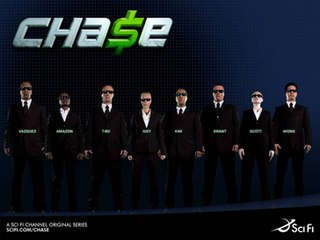
Chase is a reality competition show. It aired on Sci Fi in the United States around the same time as Estate of Panic. It is based on the successful Japanese show Run for money: Tōsō-chū which began airing on Fuji Television in June 2004. It was a mid-season replacement for the show Battlestar Galactica.

Un, dos, tres... responda otra vez, usually shortened as Un, dos, tres..., and named Un, dos, tres... a leer esta vez in its last season, was a Spanish prime-time television game show, created by Narciso Ibáñez Serrador, which was broadcast on La Primera Cadena of Televisión Española for ten seasons from 1972 to 2004.

BrainSurge is an American children's game show that aired on Nickelodeon and was hosted by Jeff Sutphen. The show taped its first season in February 2009, and debuted on September 28, 2009. The show's format was adapted from the Japanese game show Brain Survivor. The U.S. version was created by Scott A. Stone, co-creator of Legends of the Hidden Temple, and Clay Newbill, executive producer of The Mole.
4 Square was a British game show that aired on BBC1 from 3 May 1988 to 31 October 1991. It was hosted by Michael Groth for the first series and then hosted by John Sachs for three subsequent series.
Family Game Night was an American television game show based on Hasbro's family of board games and EA's video game franchise of the same name. The show was hosted by Todd Newton. Burton Richardson was the announcer for the first two seasons; he was replaced by Stacey J. Aswad in the third season, and Andrew Kishino was hired for the fourth season. The 60-minute program debuted on October 10, 2010, on The Hub ; it was previewed on October 9, 2010, on its sister channel, TLC. Seasons 1 and 2 contained 26 and 30 episodes respectively. Seasons 3, 4 and 5 each contained 15 episodes. Season 2 premiered on Friday, September 2, 2011, with additional games being added. The games added to the second season included Cranium Brain Breaks, Green Scream, Ratuki Go-Round, Simon Flash, Operation Sam Dunk, Trouble Pop Quiz, and Spelling Bee. However games from the previous season were still kept.
Winning Streak is an American television game show hosted by Bill Cullen and announced by Don Pardo. It aired weekdays on NBC from July 1, 1974 to January 3, 1975 and was produced at the NBC Studios in New York's Rockefeller Plaza.
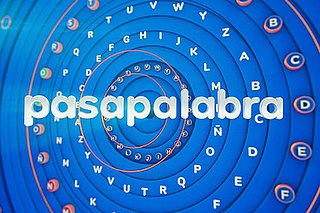
Pasapalabra is a Spanish television game show, adapted from the British format The Alphabet Game. The title is a portmanteau of the Spanish verb pasar, "pass", and palabra, literally "word".
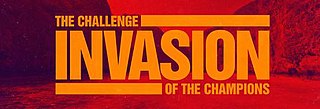
The Challenge: Invasion of the Champions is the 29th season of the MTV reality game show, The Challenge. The new individual format was filmed in Krabi, Thailand during October and November 2016, and features alumni from The Real World, Road Rules, The Challenge, and Are You the One? competing.
References
- ↑ David Schwartz, Fred Wostbrock and Steve Ryan, The Encyclopedia of TV Game $hows, 3rd ed., Checkmark Books, 1999, pp. 19.